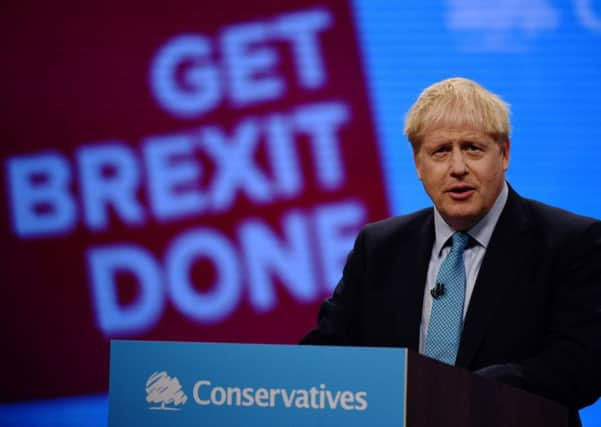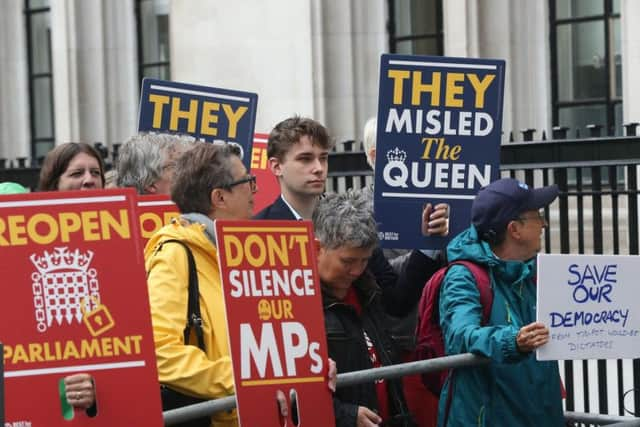Scots Tories will not be divided over no-deal Brexit – John McLellan


High-profile Conservative events are usually a magnet for bitter protest. Conference delegates are used to it and under normal circumstances Boris Johnson’s apology to members for being “peppered with abuse” on the way in to hear his closing speech would have been a safe bet.
It was certainly the case at the leadership hustings in Perth over the summer and the last time I was at the national gathering in Manchester, but these are not normal circumstances. A small protest about Hong Kong and a bigger demonstration by Waspi women on the final day protesting about pension losses apart, it was strangely quiet. For the most, part dissent was limited to a small clutch of Union Flag-waving hard Brexiteers.
Advertisement
Hide AdAdvertisement
Hide AdIt will not be the same in Edinburgh this weekend at the All Under One Banner march, however many turn up, but for a time of such division across the UK, the absence of anger in Manchester was remarkable. The police were geared up for trouble – machine gun-toting officers at every steel barrier around Manchester Central and the Midland Hotel – but there wasn’t even the backdrop of EU flags seen nightly on the television news from College Green.


Maybe Brexit has ground down the spirit of protest in England, perhaps leaving the EU is a lot more popular in the North-West than people in pro-EU Edinburgh can contemplate or is it possible that, despite all the lurid allegations, Mr Johnson simply doesn’t spark the kind of reaction the Left would like to see in a Labour-heartland like industrial Lancashire? News teams in search of division, acrimony or at least a sense of all-pervading gloom instead had to re-write their copy to reflect the dominant mood of optimism and latent opportunity that overwhelming majority of delegates believe the delivery of Brexit on October 31 would usher. Unconverted Remainers will have stayed away and the “Get Brexit Done” slogan on every wall was inescapable and despite plenty of doubts about how and when, few didn’t believe in the aim.
Brexit deal looking unlikely
By yesterday a deal was looking increasingly unlikely, but who knows? The signs are that Mr Johnson’s plan is a lot closer to sealing the deal than at any point since Theresa May first revealed the outcome of her negotiations. It has become, as the old Colgate advert had it, a ring of confidence; Ireland will approve if it is confident the EU is satisfied, the EU will approve it if is confident the Irish can live with it and it will get through the Commons, and it’s likely to get through the Commons if the DUP approves. Neither Taoiseach Leo Varadkar nor European Council President Donald Tusk have thrown it out completely, Security Minister Brandon Lewis suggested more room of manoeuvre yesterday morning, the DUP has already signalled acceptance, so maybe, with a nip and tuck, a deal can be signed off at the EU summit in a fortnight.
A well-attended Fringe meeting on Tuesday (except for billed speakers Dominic Grieve and Rory Stewart) on “finding a route out of the maze” showed how it could be done with a combination of existing systems – trusted traders, exemptions for small firms, electronic customs returns – much of which appeared in the Government’s paper revealed the following afternoon. The comparison made by ex-diplomat and now Gloucester MP Richard Graham with the Hong Kong solution of “one country, two systems” suggested he knew what was coming. While complex workable arrangements are there to be grasped, CBI director general Carolyn Fairbairn’s observation that “there is a way out of the maze, it’s just that politicians have chosen not to take it...” still rings true if reaction to the latest proposals is anything to go by.
Ballantyne favourite to replace Ruth
Interim Scottish Conservative leader Jackson Carlaw echoed the conference theme by saying after First Minister’s Questions on Thursday that, “The people of Scotland want Brexit done.” It’s unlikely to be true of as many Scots as Manchester delegates but nevertheless the dark clouds over the Scottish party in the immediate aftermath of Ruth Davidson’s resignation are beginning to shift, with the wind of change picking up speed from a breezy Prime Minister’s speech.
Conservative support in Scotland is not softening as much as public polling suggests, as evidenced by the ten per cent increase in vote share in this week’s Bridge of Don by-election, won by new candidate Sarah Cross. The combination of voter fatigue with Brexit, a deepening understanding amongst non-Nationalists that the process of independence will be more difficult and the negative impact greater, and SNP failure over priorities like school reform, named persons and hospital buildings are stacking up.
Two strong messages emerged from Scottish Conservative conversations in Manchester about the leadership contest to come, first that the resistance to even the possibility of a no-deal exit was risking division and separating Scotland from the UK party would guarantee it. It means if Murdo Fraser MSP decides to stand on the separation ticket as he did in 2011, he will almost certainly face a second defeat.
Possible candidates are beginning to test the water, with several correspondents speculating this week about who will throw their hat in the ring. Michelle Ballantyne, Liam Kerr, Jamie Green, Brian Whittle and Donald Cameron have all been touted as possibles, but as with the UK leadership, the key to victory is not current public approval – most voters won’t know any of them – but membership appeal. Fresh from her main stage appearance in Manchester, South of Scotland MSP Ms Ballantyne is already the front-runner.
Advertisement
Hide AdAdvertisement
Hide AdHowever, prospective candidates might have to keep their powder dry for now. Having taken on board the Brexit message and set aside a previously well-aired disdain for Mr Johnson, Mr Carlaw’s job is to keep a steady hand on the tiller as he did during Ruth Davidson’s maternity leave, and steer the Scottish party through the EU departure, however long that takes. If the UK does leave the EU at the end of the month, the election will take place in December and a new leader installed in January, but if UK membership is extended then so too will Mr Carlaw’s leadership. The future leadership of the Scottish party and the main opposition to the SNP therefore hinges as much on Brexit as everything else.
UK’s first black Prime Minister?
As the tail of the queue edged inside the conference centre, staff informing the line the hall was full were quickly followed by the familiar figure of Conservative chairman James Cleverly who shook the hands of each disappointed delegate still waiting and thanked them for coming, exchanging banter as he went. A class act.
Britain’s first black Prime Minster? Don’t bet against him.
